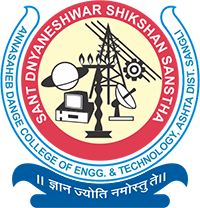Department Vision/Mission /PEO/PO’s
Vision:
-
To be a leader at serving society by producing professionally competent computer engineers.
Mission:
We at Department of Computer Science and Engineering are committed to achieve our vision by,
-
M1: Imparting academic excellence through outcome based education.
-
M2: Transforming students through skill oriented courses with ethical values.
-
M3: Grooming students for employment, higher studies and entrepreneurial ventures.
-
M4: Strengthening relationship with stakeholders for continuous development.
Programme Educational Objectives (PEOs)
Graduates of Computer Science and Engineering will:
- Demonstrate a strong foundation in computer science, applying proficiency in algorithm design, software development and problem-solving. (Domain Knowledge)
- Utilize cutting-edge technologies to solve problems, in alignment with their developed core competency. (Core Competency)
- Uphold high standards of professionalism,exemplifying ethical behavior and effective communication skills while they work in multidisciplinary teams, demonstrating leadership qualities, and positively contributing to their workplace environments. (Professionalism)
- Commit to lifelong learning, proactively staying updated on emerging technologies and industry trends. (LifeLong Learning)
Program Outcomes (POs)
Engineering Graduates will be able to:
PO 1 Engineering knowledge: Apply the knowledge of mathematics, science, engineering fundamentals, and an engineering specialization to the solution of complex engineering problems.
PO 2 Problem analysis: Identify, formulate, review research literature, and analyze complex engineering problems reaching substantiated conclusions using first principles of mathematics, natural sciences, and engineering sciences.
PO 3 Design/development of solutions: Design solutions for complex engineering problems and design system components or processes that meet the specified needs with appropriate consideration for the public health and safety, and the cultural, societal, and environmental considerations.
PO 4 Conduct investigations of complex problems: Use research-based knowledge and research methods including design of experiments, analysis and interpretation of data, and synthesis of the information to provide valid conclusions.
PO 5 Modern tool usage: Create, select, and apply appropriate techniques, resources, and modern engineering and IT tools including prediction and modeling to complex engineering activities with an understanding of the limitations.
PO 6 The Engineer and The World: Analyze and evaluate societal and environmental aspects while solving complex engineering problems for its impact on sustainability with reference to economy, health, safety, legal framework, culture and environment responsibilities relevant to the professional engineering practice.
PO 7 Ethics: Apply ethical principles and commit to professional ethics and responsibilities and norms of the engineering practice.
PO 8 Individual and team work: Function effectively as an individual, and as a member or leader in diverse teams, and in multidisciplinary settings.
PO 9 Communication: Communicate effectively on complex engineering activities with the engineering community and with society at large, such as, being able to comprehend and write effective reports and design documentation, make effective presentations, and give and receive clear instructions.
PO 10 Project management and Finance: Demonstrate knowledge and understanding of the engineering and management principles and apply these to ones own work, as a member and leader in a team, to manage projects and in multidisciplinary environments.
PO 11 Life-long learning: Recognize the need for, and have the preparation and ability to engage in independent and life-long learning in the broadest context of technological change.
Program Specific Outcome (PSO)
PSO 1: An ability to adapt to latest trends in software engineering practices and strategies in real-time software development lifecycle using open-source programming environment or commercial environment.
PSO 2 : An ability to get acquainted with contemporary trends in industrial / research areas and thereby provide solutions to real life problems, by specifically using knowledge and skills in the areas of Data Analytics, Machine Learning, Internet of Things, Cloud Computing and Security.

